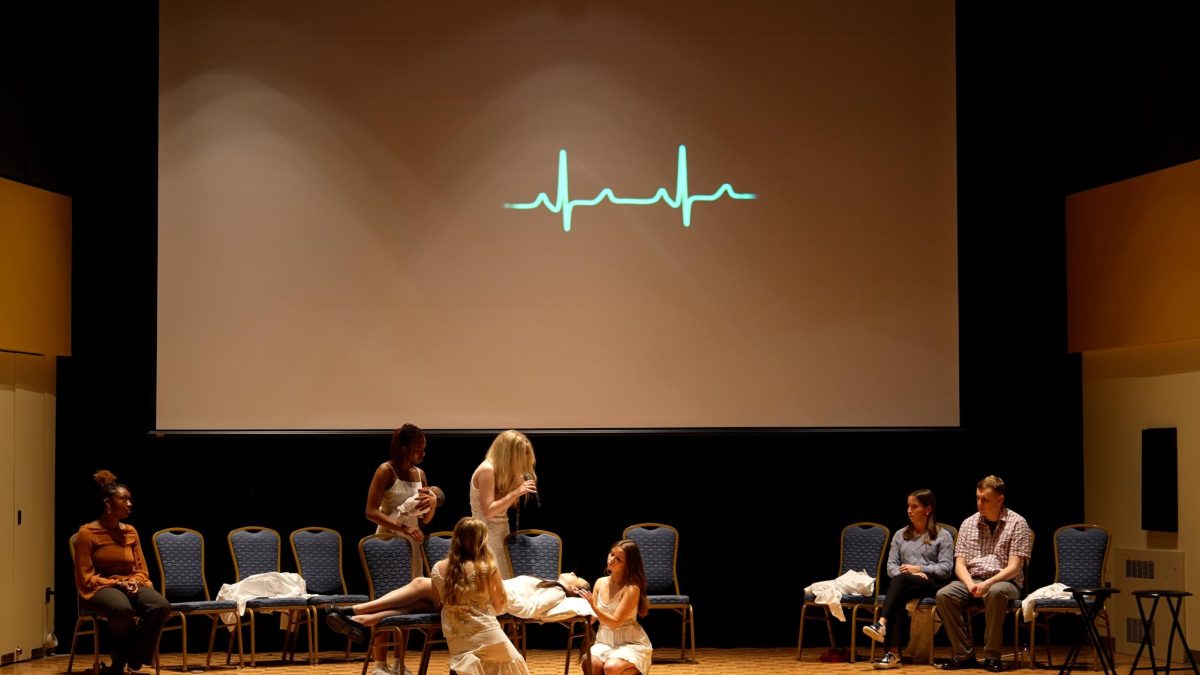On Sept. 25, the Mullen Center of Performing Arts held a complex, emotionally and morally challenging performance titled, “Theater of War: Hector, Andromache, and the Death of Astyanax.” It was a dramatic reading of scenes from Homer’s Iliad Book VI and The Trojan Women by Euripides. The story’s primary focus is the ultimate victims of war on either side, children, here done through the focus on Hector’s son, Astyanax. The dramatic reading highlights humans’ unfortunate habit of retaliating violently toward our enemies, engaging in wars and villainizing the other side. At the end of each scene, the students who performed facilitated a discussion on what they just had to interpret and the audience contributed, sharing ideas, realizations and personal stories about how war had impacted them.
University President Rev. Peter M. Donohue, O.S.A., Ph.D. opened the show and welcomed all in attendance. Then, Villanova professor Heidi Rose, the lead organizer of the show, introduced the power and importance of Greek tragedies. She began by expressing how Greek tragedies have the power to transcend time, and that they can always be applied to contemporary audiences. These stories can be reused, as the tradition of war and inciting violence upon one another is still extremely prevalent, as evidenced by the war of Ukraine-Russia and the Palestine-Israel conflict. This piece first debuted at Columbia University, and Villanova felt it was necessary to bring the performance onto campus. Students should recognize the complexities of war and not turn away in the face of discomfort, but rather feel it together.
Artistic director Bryan Doerries, who translated and facilitated the dramatic readings, took the stage, urging and pleading for audience members to welcome the gray areas that they may have never considered before in war. He shared that the purpose of this dramatic reading and others like it is to promote free speech and open dialogue, that even if people cannot agree with each other they can accept that they should hear from all perspectives. He ended with the fact that even the actors on stage only agreed to act but not to agree with each other’s beliefs. Doerries then introduced the ensemble of professional actors. The lineup consisted of Marjolaine Goldsmith, who is a part of Theater of War Productions; Josh Hamilton; Chad Coleman, from All American and The Walking Dead; and Lois Smith, who worked alongside James Dean in East of Eden. The rest of the performers were students: Rylan Fegan, Jamison Dean, Nyred Jackson, Zoe Magee, Ethan Khan, Rachel Taylor and Micki Loud. The set consisted of nothing except the table where the actors sat, in front of a completely black background. They were wearing regular clothing, hinting that there was no dress code for the characters, or possibly it was done to highlight how the themes from Ancient Greece haunt us to this day.
The performance began with the Iliad, and the great warrior Hector who had returned home to his wife and son, to say goodbye one last time, knowing that once he leaves again to fight for Troy, he will not survive. His wife Andromache, begs him not to leave her a widow and their son orphaned. Andromache feels betrayed and abandoned by Hector, but her pleas and cries are fruitless, Hector leaves and sacrifices himself to defend the Trojans and to inspire his son to be better than him.
After the reading of Book VI, the professional actors leave the stage and the performers relate what they just read to their identities and share their thoughts. Khan, bravely, shared that his mother was a survivor of the Holocaust and his paternal grandfather was taken away from India as a servant, and so he was used to the innocent civilians that suffered at the hands of war. Taylor resonated most with the line, “This has all happened before,” which emphasized that trauma and pain is passed down and we have not reached a point where we all identify that (generational) trauma nor know how to heal it. The audience then had the opportunity to share their thoughts.
“Even though war permeates through lives, this has been something that humankind has been battling,” freshman Kirandeep Kaur said.
An extremely emotional point in the discussion was when a Russian audience member expressed theirher pain from the Russia-Ukraine war. She shared that this was a war that her own country had started, and that during the dramatic reading she could not help but cry. All the emotions and moments that the performers depicted were ones that she had already experienced. She tearfully thanked the production for allowing her to relive them and reflect on the subject of war.
The performance then continued with the dramatic reading of The Trojan Women, which starts with Hector’s son, Astyanax and Andromache, who are left alone, together. Andromache is then taken away as a slave and concubine of Neoptolemus, Achilles’s son. The other women in Troy are miserable and anxious, sympathizing with Andromache and fearing for their lives. Astyanax is then executed by the Greeks, marking another child victim of war. Astyanax suffered the loss of his father, pain of his mother and of the destroyed Troy, and then was killed due to pure hatred.
These performances created discomfort throughout the crowd. Despite the nervousness amongst the audience, there was compassion and open-mindedness exhibited by Villanova faculty and peers. The uniting thought from everyone was that war crosses every boundary, even if we have instituted rules for them, every single war and violent fight will leave innocent people dead. However, we all can get so swept up into choosing sides that we forget that these are human lives that are taken away, and that a wife, a mother and more will weep for each life lost. Why continue to enforce rules in war and create villains, rather than disrupt the cycle of violence and create avenues for negotiations where children will not be victims of inhumanity?






